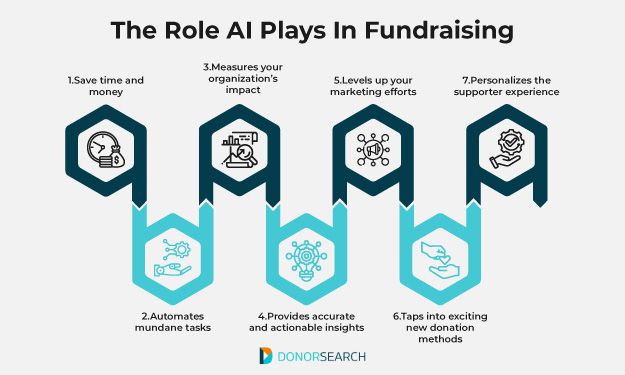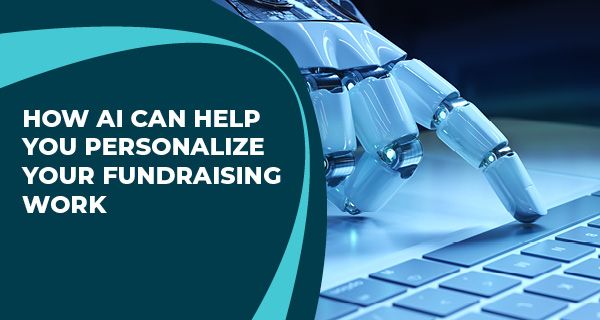When developing a donor engagement strategy for your nonprofit, personalization should be top of mind. Supporters will only want to stay involved with your organization long-term if they get the sense that you appreciate and value them. However, it’s easy for nonprofits to fall into the trap of bombarding their donors with one generic fundraising ask after another, making them feel more like ATMs with legs than members of your organization’s community.
Personalizing your fundraising efforts for each supporter takes more time, energy, and thought, but the benefits of stronger donor relationships and higher retention rates make it worthwhile. Plus, there are a variety of tools available that can streamline this process—particularly those powered by artificial intelligence (AI).
In this guide, we’ll provide an overview of the role AI plays in nonprofit fundraising and discuss how to leverage AI tools specifically for personalization. Let’s get started!
A Quick Overview of AI Fundraising
According to DonorSearch's guide to AI for nonprofits, AI is “the ability of a machine (like a computer) to ‘think' like a human and perform tasks like recognizing patterns, processing information, drawing conclusions, and making recommendations.” AI fundraising, therefore, refers to the specific ways in which nonprofits leverage tools with these abilities to engage donors and bring in revenue to fund their missions.
Leveraging AI can improve your fundraising work in several ways, including:

- Saving time and money by streamlining various everyday processes.
- Automating mundane tasks so you can focus on more important work.
- Measuring your organization’s impact to inform upcoming goals and strategies.
- Providing accurate and actionable insights into your campaign progress.
- Leveling up your marketing efforts with high-quality, tailored promotional materials.
- Tapping into exciting new donation methods such as personalized giving pages and dynamic email solicitations.
- Personalizing the supporter experience by helping you learn about your supporters and incorporate their values and interests into your relationship-building efforts.
There are two main types of AI solutions your nonprofit might use: generative and predictive. Generative AI tools develop written or visual content based on users’ prompts. ChatGPT is probably the best known generative AI tool, although there are many others, such as DALL-E (which generates images) and Synthesia (which is useful for video production).
Meanwhile, predictive AI tools process and analyze data to generate projections and suggestions for future action. Examples of these tools include Tableau (which organizes numerical data into visualized formats) and DonorSearch Ai (which analyzes donor data to make recommendations about which current and prospective supporters to prioritize in your outreach).
3 Ways to Personalize Your Fundraising with AI
Now that you know what AI tools are and how your nonprofit can benefit from using them, let’s dive into three ways you can leverage AI for fundraising personalization.
1. Conduct Prospect Research
Prospect research is the process of using data to identify potential high-impact donors for your organization. By using wealth and philanthropic screening techniques to conduct mass research or evaluate batches of prospects, you can discover which donors have both the capacity to contribute a significant gift to your organization and an affinity for your mission that would make them willing to do so.
To gain a holistic understanding of your prospects, your nonprofit’s team will likely leverage several tools, such as:
- Your organization’s constituent relationship management (CRM) system
- SEC investment records
- FEC political contribution information
- Third-party prospect research databases
Once you’ve found preliminary information through these resources, an AI solution can further enrich your understanding of your prospects through a process known as predictive modeling. This involves using machine learning to sift through your data and prioritize your highest-value prospects so you know who to start building a relationship with and eventually request a donation from based on the prospect’s unique interests and financial situation.
2. Segment Your Supporters
Predictive AI tools can also help you access insights into your entire supporter base by aiding in the process of donor segmentation. Segmentation involves grouping your supporters based on shared characteristics with the goal of more targeted outreach that leads to longer-term donor relationships.
With the help of your AI solution’s analytics capabilities, NXUnite’s donor retention guide recommends segmenting your supporters based on the following characteristics:
- Giving history, such as their average gift amount and frequency of giving.
- Other forms of past engagement like volunteering or attending events.
- Interests and values related to your mission and fundraising activities.
- Communication preferences, including both the communication method and timing of messages.
When you know this information about your supporters, you can reach out to each segment separately with requests they’ll be receptive to. Also, just like with prospect research, your AI tool can help you decide which segments to prioritize for each of your campaigns.
3. Create Targeted Communications
Once you’ve used predictive AI solutions to figure out who your top prospects and supporters are, leverage generative AI tools to tailor your communications to each group. AI can help with brainstorming and developing the reusable elements of your communications, allowing you to focus on improving the personalized aspects of each message.
For example, you can use generative AI tools to come up with:
- Email subject lines. To find the best subject lines for an email marketing campaign, A/B testing can help you see which of two subject lines prompts the most people to open the message. An AI tool can not only generate a variety of options for you to test but also use language that appeals to a particular donor segment. You can also set up an automated system that inserts the donor’s name into the subject line to make them even more likely to read the email.
- Text message series. For donors who prefer to communicate via text message, AI can give you ideas for follow-up cadences, message content, and places to incorporate the supporter’s name and engagement history into the message. Many SMS providers limit texts to 160 characters, so double-check that the responses your AI tool generates are within that limit.
- Direct mail copy. Generative AI can even create entire fundraising letter templates tailored to each of your nonprofit’s campaigns. You can then modify these templates to align with your organization’s preferred tone of voice and include space to write in the donor’s name and other personal information. The backbone of the copy will be ready to go, so all you need to do is add a personal touch to each letter.
Additionally, consider adding an AI chatbot to your nonprofit’s website. Websites are inherently mass marketing tools, so you can’t really personalize the content for each visitor. However, a chatbot can at least help personalize the user experience by answering specific questions and directing visitors to the pages they want to see.
Before incorporating AI solutions into your fundraising efforts, your nonprofit needs to commit to using AI responsibly. Especially when leveraging AI for personalization, you’ll work with a lot of potentially sensitive information about current and prospective donors. But by pledging to abide by data ethics and privacy standards and being transparent about your AI use, you can make the most of these tools while protecting your organization’s reputation.
Special thanks to Sarah Tedesco for the expert advice. Sarah Tedesco is the Executive Vice President of DonorSearch, a prospect research and wealth screening company that focuses on proven philanthropy.
Sarah is responsible for managing the production and customer support department concerning client contract fulfillment, increasing retention rate and customer satisfaction. She collaborates with other team members on a variety of issues including sales, marketing and product development ideas.
